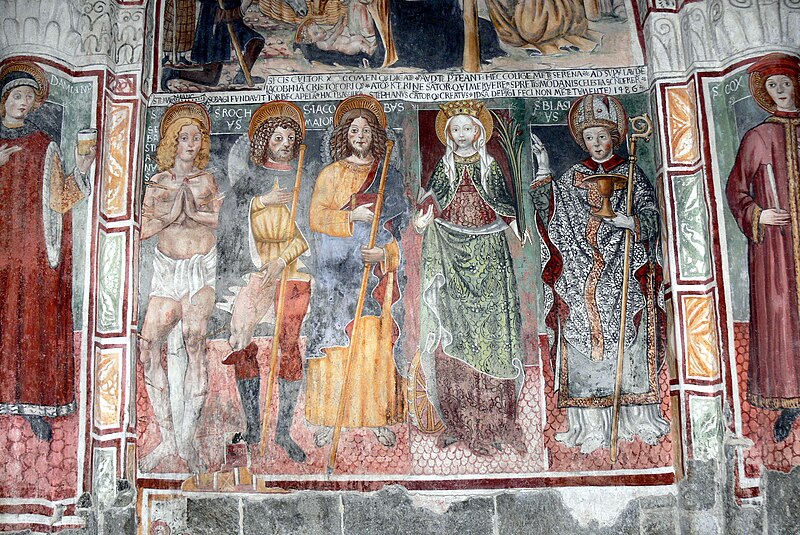The following information was found at: www.franciscanmedia.org/saint-blaise/ A wonderful site for all kinds of information on Saints.  |
Orta–Basilica San Giulio. Detail of fresco showing St. Catherine of Alexandria, surrounded by Saints Sebastian, Rochus, James the Greater, and Blaise. |
Saint Blaise’s Story
We know more about the devotion to Saint Blaise by Christians around the world than we know about the saint himself. His feast is observed as a holy day in some Eastern Churches. In 1222, the Council of Oxford prohibited servile labor in England on Blaise’s feast day. The Germans and Slavs hold him in special honor, and for decades many United States Catholics have sought the annual Saint Blaise blessing for their throats.
We know that Bishop Blaise was martyred in his episcopal city of Sebastea, Armenia, in 316. The legendary Acts of St. Blaise were written 400 years later. According to them Blaise was a good bishop, working hard to encourage the spiritual and physical health of his people. Although the Edict of Toleration (311), granting freedom of worship in the Roman Empire, was already five years old, persecution still raged in Armenia. Blaise was apparently forced to flee to the back country. There he lived as a hermit in solitude and prayer, but he made friends with the wild animals. One day a group of hunters seeking wild animals for the amphitheater stumbled upon Blaise’s cave. They were first surprised and then frightened. The bishop was kneeling in prayer surrounded by patiently waiting wolves, lions and bears.
The legend has it that as the hunters hauled Blaise off to prison, a mother came with her young son who had a fish bone lodged in his throat. At Blaise’s command the child was able to cough up the bone.
Agricolaus, governor of Cappadocia, tried to persuade Blaise to sacrifice to pagan idols. The first time Blaise refused, he was beaten. The next time he was suspended from a tree and his flesh torn with iron combs or rakes. Finally, he was beheaded.
Reflection
Four centuries give ample opportunity for fiction to creep in with fact. Who can be sure how accurate Blaise’s biographer was? But biographical details are not essential. Blaise is seen as one more example of the power those have who give themselves entirely to Jesus. As Jesus told his apostles at the Last Supper, “If you remain in me and my words remain in you, ask for whatever you want and it will be done for you” (John 15:7). With faith we can follow the lead of the Church in asking for Blaise’s protection.